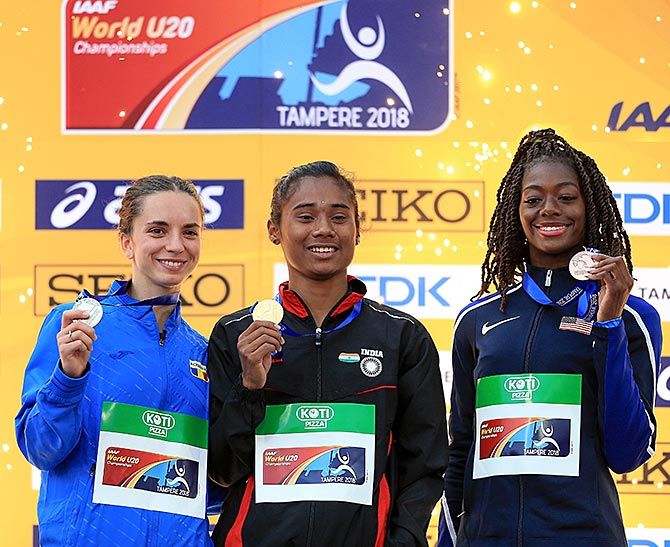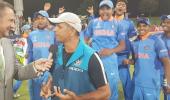Hima Das represents the generation of Naya Bharat athletes who are conscious of their responsibilities towards their society, state and country.
A fascinating excerpt from Abhishek Dubey and Sanjeeb Mukherjea's She Dared: Women In Indian Sports.

In Dhing, a town in Assam, there is a small village, Kandhulimari.
This village is roughly 23 km away from central Assam's Nagaon district headquarters.
This story is about a girl child born in the village where roughly a hundred families live.
She is one of five siblings.

Her parents, Jonali Das and Ranjit Das, are rice farmers and they belong to the indigenous Kaibarta community.
As far as the parents's memories go, the girl loved playing every kind of sport as a child.
She just wanted to go outside and express herself through sports.
The passion followed her when she started going to Dhing Public High School.
She played every game in the school and clinched gold and silver medals in them.
But of all the games she played, she had a soft spot for football.
She could often be seen playing football in different grounds, whenever and wherever she got the opportunity.
Then one fine day, everything changed.

Shamshul Sheikh, the physical education teacher of the Jawahar Navodaya Vidyalaya, gave the most valuable tip to the girl.
Impressed with her incredible speed while playing football, he advised her to leave her first love, football, and instead focus on sprinting.
For a better future in athletics, Sheikh advised the girl and her father to get in touch with Gauri Shankar Roy, a sports teacher in Nagaon.
When they went to meet Gauri Shankar Roy, he asked the girl to run.
She got selected for the district meet.
Her father gave her company while she practised early in the morning.
Both of them used to wake up at 4 am every day and go for long runs.
After two weeks of running, she started waking up her father earlier, to run even longer distances.
Meanwhile, her love for football continued.
While she participated in the athletics meet, she continued playing football with the local boys.

Once, a women's football tournament was held in Dhing.
She wanted to participate in the tournament and her father met the coach, making the request.
The coach agreed.
She played for one of the teams in the second half and scored a goal within a few minutes.
She became so popular after this that different teams started hiring her whenever there was a football match in the area.
She used to get Rs 400-500 for every match that she played.
She ran hard on those muddy football grounds to train herself for the athletics competitions as well.
There was no professional track near her home where she could practise.

Along with running, she used to help her father in the paddy fields whenever required.
She ploughed and flattened the field when her father needed rest.
She used to carry the produce weighing around three quintals, home on a bicycle.
She could not bear to see her father struggling.

Gradually, the girl started dreaming of wearing the Indian jersey.
She realised that her dream would remain unfulfilled if she didn't focus solely on athletics.
The resilient sprinter scalped a bronze medal in the state meet.
And then the nationals, and finally the big day came.

July 12, 2018.
In the 400 metres final in the IAAF World U20 Championships at Tampere, Finland, she clocked 51.46 seconds to reach the finishing point.
She started slowly in the first half, but accelerated in the last 100 metres.
She overtook three competitors to reach her goal.
She became the first Indian sprinter to win a gold medal at an international track event.
She dared.
She is Hima Das.
The entire country now knows her as the Dhing Express.
Hima Das has been improving with every event.
However, she is still a work in progress.
She has to go a long way to reach the podium at the Olympics.
However, off the field, some of her statements of intent reveal her inner self and her true character.
The determination of Hima Das represents the mindsets of the emerging athletes of new India.
When her home state of Assam was in the throes of one of the worst spells of flooding in recent years, she was participating in training camps and athletic meets in Europe.
However, Hima Das came out in support of the flood victims.
She donated half her month's salary, which she gets as an HR officer of the Indian Oil Corporation.
More importantly, in her tweets which followed, she appealed to corporates and individuals to come forward with assistance.
Before this, she had already taken the lead in the village's fight against country liquor vending.
When Hima came to know about a few members of the village selling country liquor, she took with herself a team of women from the village and demolished the liquor shops.
In 2013, Hima Das formed a social help group 'Mon jai', an Assamese phrase meaning 'I want to' or 'I feel like', with the support of six local friends.
This group is engaged in social work and this includes helping the lesser privileged sections of society.
Sportspersons of previous generations used to think of philanthropy on retirement.
But Hima Das represents the generation of Naya Bharat athletes who are conscious of their responsibilities towards their society, state and country even while they play.
There is a uniqueness in Hima Das's narrative.
Excerpted from She Dared: Women In Indian Sports by Abhishek Dubey and Sanjeeb Mukherjea, with the kind permission of the publishers, Rupa Publications India.













 © 2025
© 2025